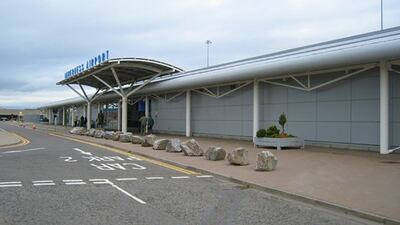Inverness Airport has hit back at claims by the UK government that it allowed a private jet to fly to Russia after a ban had been put in place.
A private jet, carrying a family of three, was allowed to leave the airport for Russia a day after the government had imposed a ban on flights to the country over its invasion of Ukraine.
The Department of Transport had accused Inverness Airport of flouting the new rules, but the airport said leaked memos show it acted correctly.
On Thursday, the UK's Transport Secretary Grant Shapps said the plane should not have been allowed to leave and accused the Scottish government of being “embarrassed” for “ignoring” it.
“It shouldn't have happened,” he told Sky News.
“We sent out a notice saying you should not have allowed it to go. A law has now been passed to put in place other restrictions. The airport should not have allowed it to go.”
Highland and Islands Airports Ltd, the operator of Inverness Airport, said it had acted in accordance with the regulations and told The National the memos “make it clear” it did everything it should have.
“We carried out the instructions received from the authorities at the time to the letter,” it said.

“Our actions were correct and appropriate and this has been borne out by an examination of the record.”
On Wednesday, UK Prime Minister Boris Johnson was asked to reveal who was on the flight and why it had not been stopped from taking off, after Mr Shapps claimed ignorance of the identities of those on the plane.
“Air traffic control transcripts published this week have revealed that despite being informed of the intended flight, no attempt was made by the UK government, or its agencies, to prevent the plane from taking off,” Scottish National Party MP Richard Thomson said.
“Will the prime minister commit to informing the House at the earliest opportunity: who was travelling on that flight; why, despite being informed in advance of the flight, was no attempt made by the UK government to keep the plane on the ground; and what will the prime minister personally do to try to prevent any similar breaches of sanctions from happening in the future?”
A Notice of Air Missions outlawing such flights was in place at the time.
“It is entirely incorrect to claim the transport secretary authorised this specific flight. Inverness Airport did not contact the Department for Transport before the flight left,” the department said.
“A [Notice of Air Missions] was issued on 25 February by the [air traffic control services provider] NATS on behalf of the UK government informing all aviation stakeholders. It is the responsibility of all operators, including Inverness airport, to ensure they are monitoring NOTAMs and complying with the restrictions.”

On Thursday, the UK government announced further sanctions against the Russian airline sector.
State-owned Aeroflot, Russia’s largest airline, Ural Airlines and Rossiya Airlines will now be unable to sell their unused, lucrative landing slots at UK airports — preventing Russia from cashing in on an estimated £50 million.
“As long as Putin continues his barbarous assault on Ukraine, we will continue to target the Russian economy. We’ve already closed our airspace to Russian airlines,” Foreign Secretary Liz Truss said.
“Today we’re making sure they can’t cash in their lucrative landing slots at our airports. Every economic sanction reinforces our clear message to Putin — we will not stop until Ukraine prevails.”
The news comes as Mr Shapps takes up the presidency of the International Transport Forum, which he will use to call for a united response against Russia’s invasion of Ukraine.


